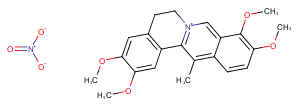Dehydrocorydaline nitrate
| Code | Size | Price |
|---|
| TAR-T2S2362-1mg | 1mg | £140.00 | |||||||||||||||||||||||||||||||||||||||||||||||||||||||||||||||||||||||||||||||||||||||||||||||||
| Special offer! Add £1 to your order to get a TargetMol CCK-8 Kit. Read more here. | |||||||||||||||||||||||||||||||||||||||||||||||||||||||||||||||||||||||||||||||||||||||||||||||||||
Quantity:
| TAR-T2S2362-1mL | 1 mL * 10 mM (in DMSO) | £292.00 | |||||||||||||||||||||||||||||||||||||||||||||||||||||||||||||||||||||||||||||||||||||||||||||||||
| Special offer! Add £1 to your order to get a TargetMol CCK-8 Kit. Read more here. | |||||||||||||||||||||||||||||||||||||||||||||||||||||||||||||||||||||||||||||||||||||||||||||||||||
Quantity:
| TAR-T2S2362-5mg | 5mg | £292.00 | |||||||||||||||||||||||||||||||||||||||||||||||||||||||||||||||||||||||||||||||||||||||||||||||||
| Special offer! Add £1 to your order to get a TargetMol CCK-8 Kit. Read more here. | |||||||||||||||||||||||||||||||||||||||||||||||||||||||||||||||||||||||||||||||||||||||||||||||||||
Quantity:
| TAR-T2S2362-10mg | 10mg | £445.00 | |||||||||||||||||||||||||||||||||||||||||||||||||||||||||||||||||||||||||||||||||||||||||||||||||
| Special offer! Add £1 to your order to get a TargetMol CCK-8 Kit. Read more here. | |||||||||||||||||||||||||||||||||||||||||||||||||||||||||||||||||||||||||||||||||||||||||||||||||||
Quantity:
| TAR-T2S2362-25mg | 25mg | £680.00 | |||||||||||||||||||||||||||||||||||||||||||||||||||||||||||||||||||||||||||||||||||||||||||||||||
| Special offer! Add £1 to your order to get a TargetMol CCK-8 Kit. Read more here. | |||||||||||||||||||||||||||||||||||||||||||||||||||||||||||||||||||||||||||||||||||||||||||||||||||
Quantity:
| TAR-T2S2362-50mg | 50mg | £863.00 | |||||||||||||||||||||||||||||||||||||||||||||||||||||||||||||||||||||||||||||||||||||||||||||||||
| Special offer! Add £1 to your order to get a TargetMol CCK-8 Kit. Read more here. | |||||||||||||||||||||||||||||||||||||||||||||||||||||||||||||||||||||||||||||||||||||||||||||||||||
Quantity:
Prices exclude any Taxes / VAT
Overview
Regulatory Status: RUO
Shipping:
cool pack
Storage:
-20℃
Images
Documents
Further Information
Bioactivity:
1. Dehydrocorydaline(DHC) not only inhibits antibody-mediated allergic reactions but also influences cell-mediated allergic reactions, and the inhibitory effect of Corydalis Tuber on allergic reactions may be partially attributed to DHC. 2. Dehydrocorydaline can inhibit elevated mitochondrial membrane potential in lipopolysaccharide-stimulated macrophages. 3. Dehydrocorydaline has antinociceptive effects in mouse models of inflammatory pain, the effects involve the opioid receptor and inflammatory cytokines. 4. Dehydrocorydaline has anti-inflammatory activity.
CAS:
13005-09-9
Formula:
C22H24N2O7
Molecular Weight:
428.441
Pathway:
Microbiology/Virology; MAPK; DNA Damage/DNA Repair; Autophagy; Apoptosis; ; Chromatin/Epigenetic; Proteases/Proteasome
Purity:
0.9979
SMILES:
[O-][N+]([O-])=O.COc1ccc2c(C)c3-c4cc(OC)c(OC)cc4CC[n+]3cc2c1OC
Target:
BCL; PARP; p38 MAPK; Caspase; Parasite; Autophagy
References
1. Ishiguro K , Ando T , Maeda O , et al. Dehydrocorydaline inhibits elevated mitochondrial membrane potential in lipopolysaccharide-stimulated macrophages[J]. International Immunopharmacology, 2011, 11(9):0-1367.



